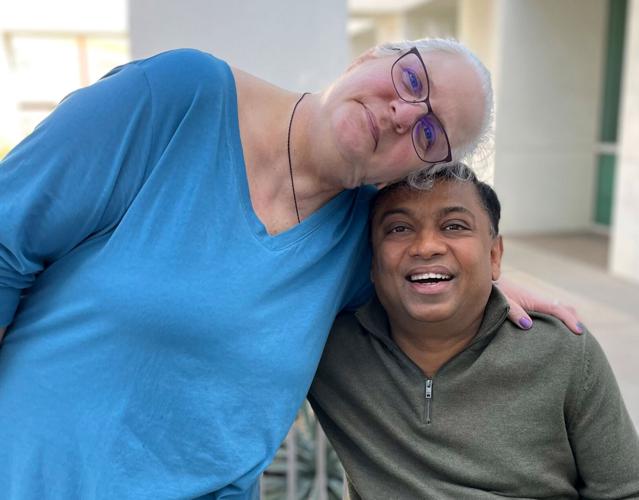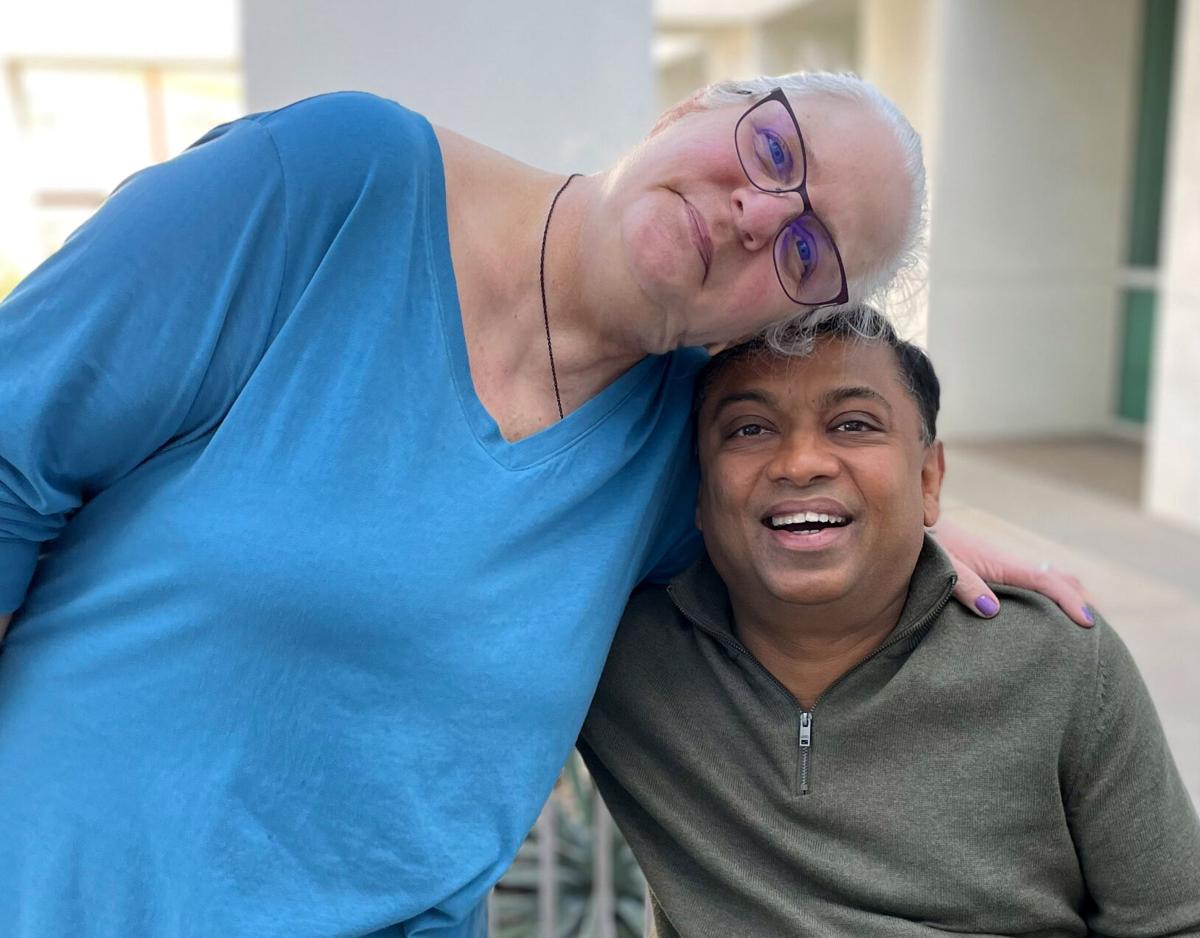Cindy Colbert lost her husband in March 2020, and a week later, the world shut down.
With businesses shuttered and the pandemic lockdown in effect, Colbert says she sat at home and ate her feelings. As time passed and she gained weight, she found she was in constant pain and becoming short of breath while walking from room to room in her home.
During her annual physical in 2021, Colbert, who weighed in at more than 300 pounds, discussed her asthma and pain with her primary care physician, who asked her if she was ready to take action.
“For the first time, I felt when she asked if I was ready to do something about it, I was ready,” Colbert, 58, said. “I had gotten to that point and I couldn’t live like that anymore. I was ready to make those changes.”
Colbert was referred to Banner-University Medical Center Tucson’s Clinical Weight Loss Program, which seeks to help people improve their health by promoting long-term lifestyle changes related to weight loss.
A little over a year later, Colbert was down 100 pounds, and she continues to lose weight, thanks to the changes she made.
The program, headed by Dr. Amit Algotar, offers medical, psychological and behavioral support; nutritional evaluation and counseling; and an individualized exercise and training plan.
Banner officials say that while other doctors may prescribe weight loss medications, no other Tucson hospital has a multi-modality program like theirs that offers surgical and nonsurgical weight loss options. Over the past decade, it has helped thousands of people achieve their weight loss goals and improve their overall health and well-being.
‘Being open is most important thing’
The clinical weight loss program, located at Banner-University of Arizona South, 2800 East Ajo Way, started as an employee wellness program, but by 2013, it was available to all patients, says Algotar, who joined in 2016.
It’s open to non-smokers between the ages of 18 and 65 with a body mass index over 40, or over 35 and combined with illnesses such as diabetes, who aren’t pregnant.
The program is covered by insurance with out-of-pocket costs determined by each person’s policy, Banner says. Referrals are required.
Algotar called it a comprehensive medical bariatric program that involves a multitude of dietary plans and medications as options for weight loss. But it’s more than diet and exercise. Algotar and other providers look at the patient’s full medical picture, including other diagnoses and mental health.

“Every patient is different. Every patient’s needs are different,” Algotar said. “We don’t have a cookie cutter approach and we don’t hand out the same meal plans to everybody who walks in the door.”
The doctors who run the clinic aren’t surgeons, but they do work with a surgical team. If participants are interested in bariatric surgery, their progress will be evaluated after several months in the program to determine if surgery is an appropriate option.
Algotar said it’s all about doing what works for the patient.
Cindy Colbert “was open to ideas. She was open to doing different things, open to researching, open to finding new recipes,” Algotar said. “Being open is the most important thing in terms of finding that thing that works for the patient.”
After working together for a year and a half, Algotar and Colbert finally met in person in February, having conducted all of their sessions via Zoom. Algotar called the advancement of telemedicine a silver lining of the pandemic, as the program now serves patients across the state.
‘Awareness made a big change’
Colbert said that the first time she met with Algotar, he just asked her to pay attention to what she was eating, including when, how much and how she felt.
“The first couple of weeks, just being aware of what I was eating made me make a little bit of changes. Not necessarily what I was eating, but when I was eating,” Colbert said. “Even though I hadn’t made any dietary changes, I still started losing weight because I wasn’t eating right before bed or I wasn’t eating a full bowl of nachos. Just that awareness made a big change.”
From there, Colbert reduced her carbohydrate intake to 50 grams a day. She started looking at ingredients and changing the foods she ate.
“Basically I had changed to eggs for breakfast, a salad for lunch and chicken with some kind of vegetable for dinner,” Colbert said. “I started dropping weight pretty quickly based on how much I was moving and because I was getting the right amount of food.”
A decade ago, when Colbert first tried to lose weight, another doctor had told her she needed to walk 30 minutes a day.
“I’m like, ‘I can’t even walk to the corner without being in pain, how am I supposed to do this for 30 minutes?’” she said.
But when Colbert first connected with Algotar, he suggested she just walk through the house from one room to another and do a circuit.
“He said, ‘If you get tired or if your back starts to hurt, sit down. You don’t have to do it all at one time,’” Colbert said. “So long as you get up and move, you can move 30 minutes a day in five-minute spurts.”
She started tracking her steps and finding ways to get out and walk while still beating the summer heat.
“You get set on you’ve got to go out and jog or you’ve got to lift weights, and that’s not it. It’s just getting up and eating the right things and movement,” she said. “Walk, run, swim, hike. Go to the zoo and walk through the zoo. That’s exercise. It doesn’t have to be strenuous.”
Colbert called Algotar her biggest cheerleader throughout her weight loss journey, saying he helped her stay on top of things and think about events that could affect the food she eats, including holidays and family gatherings.
Because of the changes Colbert made through the program, she’s able to be active and play with her grandchildren. She recently moved and, unlike the last time, was able to help carry boxes up and down stairs without breaks.
“Last time, the only thing that I could do was sit on my butt and pack boxes,” she said.
Her A1C — a blood test that measures average blood sugar levels over the past three months — has dropped below the diabetic threshold.
“A lot of older people think, ‘I can’t do it. I’m too old.’ That was one of the things I thought,” Colbert said. “But you’re never too old. As long as you can move, you can do it.”
‘A huge biology behind it’
Algotar said that while Colbert’s approach has worked for her, everyone is different, and every diet and exercise plan looks different.
“For Cindy, the low-carbohydrate approach has worked fantastic. At the same time, for somebody else, this may not be the approach,” Algotar said.
“They may work better with a low-calorie approach or intermittent fasting approach or time-restricted feeding approach or a dash diet (to help treat or prevent high blood pressure) or a vegetarian diet. Every approach has its positives and negatives and each approach could be useful for a different kind of individual.”
Algotar, who has been researching obesity since 2003, said that for many people, maintaining weight loss is the real challenge.
“It’s not just about behavior, there is a huge biology behind it. Our bodies hate losing weight and that’s because our bodies consider fat as an insurance policy against starvation,” he said. “Way back when ... starvation was a real problem that could have wiped out our species.”
There are hormones that try to push a person to eat more as they gain weight, Algotar said, adding that the key is staying focused and being mindful of what is happening.
“We don’t have a structured program, it’s just based on what they’re presenting with and what the patient’s needs are,” Algotar said. “If a patient is ... like Cindy, we let them do their thing ... and see them prosper, see them flower, see them be successful.”
Algotar is also involved with the Arizona Obesity Organization, which works to help educate healthcare providers against bias and provide effective treatment.
“A lot of times patients experience a lot of bias, a lot of negative attitudes, even from health care. The message is, ‘Eat less and exercise... and if you don’t do it, it’s your fault,’” he said.
“For patients who are thinking about weight loss who are thinking about trying to see what they can do, I don’t want them to feel defeated in any way, because there is hope, there are options.”
Get a roundup of solutions reporting from the Arizona Daily Star at linktr.ee/starsolutions. Video by Caitlin Schmidt / Arizona Daily Star.






